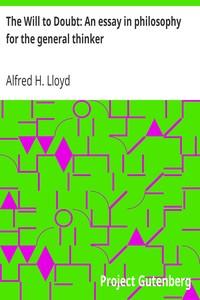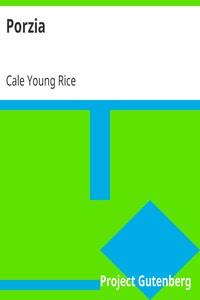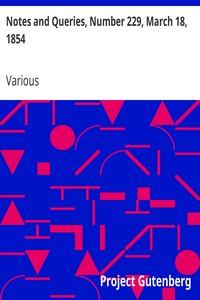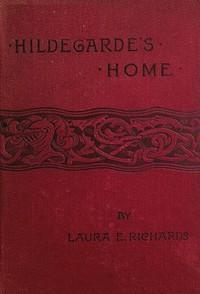Read this ebook for free! No credit card needed, absolutely nothing to pay.
Words: 82366 in 10 pages
This is an ebook sharing website. You can read the uploaded ebooks for free here. No credit cards needed, nothing to pay. If you want to own a digital copy of the ebook, or want to read offline with your favorite ebook-reader, then you can choose to buy and download the ebook.


: The Will to Doubt: An essay in philosophy for the general thinker by Lloyd Alfred H Alfred Henry - Belief and doubt; Philosophy Introductions
THE WILL TO DOUBT.
INTRODUCTION.
Without undue sensationalism it may be said that this is an age of doubt. Wherever one looks in journeying through the different departments of life one sees doubt. And one sees, too, some of the blight which doubt produces, although the blight is by no means all that one sees. There is heat everywhere in the physical world, but not necessarily only arson or even destructive fire. Morals, however, social life, industry, politics, religion, have suffered somewhat--and many would insist very seriously--from the prevailing doubt. Moreover, if the outward view shows doubt everywhere, the inward view is at least not more reassuring. Who can examine his own consciousness without finding doubt at work there? We would often hide it from others, not to say from ourselves, but it is there, and we all know it to be there. Other times may also have been times of doubt, but our day, as the time to which we certainly owe our first and chief duty, is very conspicuously and very seriously a time of doubt.
Now there are some, and they are many, who would decry the discussion of such a thing as doubt, for they see only danger ahead. Doubt they compare with death or disease, and to dwell upon any of these is idle, unnatural, morbid. Why not let such things alone, and look only to what is pleasant, to what is good and true and beautiful? Then, too, doubt, the confession of doubt, is the royal entrance to philosophy and the risk of an entanglement with philosophy, which seems to them the source of much that is harmful, the essence of all that is impractical, is altogether too great. Doubt for them is even less to be played with than fire, with which already it has been compared here. Again, as others in matters political and industrial, so they in matters intellectual and spiritual resent anything that appears likely in any way to disturb the standing credit of the country. To doubt is just to join the opposition, and the opposition is made up of heretics and agents generally of mere destruction. To treat doubt as real and positively significant, as having any true worth in human experience, as being even a proper object of will, is to stop permanently, not the wheels of commerce and industry, but the wheels of the present life in all its phases. In a word, perhaps one of the words of the hour, Christian Science has not wished to be more inhospitable to the reality of disease than have these believers to the reality and usefulness of doubt.
Yet all who feel in this way are short-sighted. Their contentions, like those of their cousins, perhaps their country cousins, the Christian Scientists, may have worth for being corrective, but at very best they are only one-sided. In a fable, never in real life, a man might get the smell of burning wood in his house and refuse to recognize the danger because of the inevitable delay to his business which the alarm of fire would involve; but doubt is not less real nor less dangerous, nor even less capable, when under control, of useful applications. Any danger, too, squarely faced is at least half met. Why, then, be so impracticable, so like characters in fables, as to overlook or turn one's back upon the doubt of the day, refusing it a place and a part in real life? The negative things of life can be so only relatively. Death itself cannot possibly be absolute, and doubt, not unlike death, indeed perhaps only one of death's messengers, must be even a gift, or an agent, of the gods. Some things, dangerous when hidden, are wonderfully serviceable, when recognized and controlled. Sometimes men really have entertained angels unawares.
And so throughout these chapters, although some may think me and those who follow me morbid, and although we may have to enter the dangerous parlour of philosophy, the doubt of our time is to be squarely and fairly faced. In all candour, we are from the start to be confessed parties to it, hiding nothing intentionally, and at the same time trying always to give nothing undue emphasis. The doubt that all seem to know, that many really feel without perhaps clearly confessing, and that some confess or even actually boast, we shall face and examine closely, trying as we can to find its true meaning and real worth. In short, the confession of doubt, of our doubt, and the fruits of confession are the burden of these chapters.
THE CONFESSION OF DOUBT.
Our confession must, of course, be thorough-going, and can be made so only through a complete statement of every possible reason that experience affords for the attitude of doubt. To the end, therefore, of such a statement we shall consider in this chapter certain general and easily recognized facts about doubt itself, while in chapters that follow we shall continue the confession by examining, first, our customary or "common-sense" view of things, and then the view of science, and having brought together in each case numerous incongruities, or contradictions, which ordinarily are at best only casually noticed or timorously overlooked, we shall find ourselves facing in a peculiarly telling way, not only certain strong reasons for doubt, but also some of the real issues that doubt raises. As no issue, moreover, can be more central or crucial than the meaning of the contradictions found to pervade our views of things, before completing our confession we shall allow ourselves some reflections, that should prove useful to us in the end, upon the possible worth of contradiction in human experience; for even to casual thinking contradiction, although good ground for scepticism, suggests some positive advantage and opportunity; the advantage of breadth, for example, of freedom from special form, or the opportunity of personal spontaneity and initiative as against the restraints of formal consistency, of class, and of institution; and if these things, among others, can be associated with our case for doubt, our reflections will certainly not have been in vain. Then we shall close our confession by seeking the companionhip of a great doubter of modern times, and by learning what we can from him of doubt itself and of the doubter's natural world. And finally, as a result of all our own efforts, supplemented by his help, we shall be able to reap some of the fruits for life and thought that a confession so fully made may fairly claim.
From start to finish, moreover, of this study of doubt we have to remember that there can be no important difference between what is possible and what is real. Thus anything whatsoever that can possibly be doubted is really doubtful. Also, if anybody is amazed to hear mention of facts about doubt, as if doubt should not somehow submit to its own nostrum, let him merely reflect that, strangely enough, nothing is quite so indubitable as doubt, nothing so convincing as the reasons for doubt. Let me not be too subtle, but to doubt doubt is only to affirm it, and somehow--whether for good or ill need not now be said--all the negative things of life possess a peculiar certainty, and are all most easily proved. A great Frenchman once put the case quite plainly when he said, after canvassing very carefully the whole field of his consciousness, that his doubts were the only things there, the only things he could be quite certain about, and these were so very real that they left him absolutely nothing but belief in himself, in his all-doubting and ever-doubting self, to rest upon. His was surely a sweeping confession, and his residuum of belief may not at first sight seem very promising or very substantial, but quickly, I think, we shall find ourselves in agreement with him, at least as to the reality and the wide scope of our doubting, and it is also a possibility well worth foreseeing that we may even find his belief in the reality of an ever-doubting and all-doubting self a rock for our own saving.
Our life is ever cherishing what we are pleased to call its verities, some in religion and morals, some in politics, some in mathematics and science, some in the more general relations to nature, but what elusive things these verities are! How shallow, or how hollow all of them are, or at one time or another may become. To take a rather minute case, such as it is always the philosopher's license to make use of, a case that is, however, quite typical in experience; here is a word--any word you like--that has been spoken and written by you for years. Always before it has been spelt correctly and clearly understood, but to-day how unreal it seems. Are those the right letters, and are they correctly placed? Is that the true meaning? What has happened, too, to give rise to these unusual questions? Well, who can say? And who has not substantially asked every one of them, not merely with reference to some long-familiar word, but also with reference to much larger things in life? Self and society, love and friendship, mind and matter, nature and God have again and again been subjected to essentially the same questioning. The verities of life, all the way from simple words used every day to the great things of our moral and spiritual being, have lost, sometimes slowly, sometimes very suddenly, the reality with which we have supposed them endowed, and although we may still bravely believe we find ourselves crying out passionately for help in our unbelief. There certainly are the verities; not one of them can possibly fall to the ground; yet these very verities are never quite in our experience.
Still the world has its thoroughly confident people. Every one of us has met some of those estimable beings to whom doubt seems wholly foreign, people who assert with trembling voice and sacred vow that their convictions, political perhaps or religious, are unassailable, and that they must hold them to the grave. But, whatever may be said of political convictions, religious convictions have often been regarded as a contradiction of terms. How can one be sure and religious at the same time? Moreover, positive people under any standard are notoriously as fearful as they are dogmatic. Fear is often, if not always, the chief motive of dogmatism, and fear is hardly the most natural companion of genuine confidence. The part which the emotion of fear has had, both in the personal life and in the doctrine of the dogmatic among men, would make a most instructive study.
If, then, dogmatic people are slaves to their fears, while more thoughtful people, as has not needed to be said, seem to get no reward from their self-consciousness but the uncertain reward of their doubts, then only such as live quietly, asserting nothing, depending on nothing, and even assuming nothing, but simply taking what comes, are left to represent genuine belief. Yet how many such are there? A few may seem to approach the ideal, if ideal it be, but the class itself in realization must be said to be a hypothetical one, and few, if any, of us could ever really envy or strive to imitate its supposed manner of living; for, in spite of all the dangers and all the doubts and fears, only the constantly examined life can ever really lure us. Doubt, besides being a general condition of life, seems to be also incident to what gives life worth.
Free books android app tbrJar TBR JAR Read Free books online gutenberg
More posts by @FreeBooks


: Notes and Queries Number 229 March 18 1854 A Medium of Inter-communication for Literary Men Artists Antiquaries Genealogists etc. by Various Bell George Other - Questions and answers Periodicals Notes and Queries


: The Life and Public Services of James A. Garfield Twentieth President of the United States Including Full and Accurate Details of His Eventful Administration Assassination Last Hours Death Etc. Together with Notable Extracts from His Speeches and Letters





